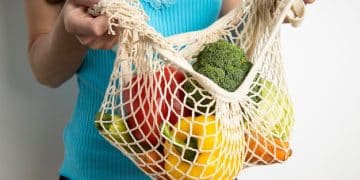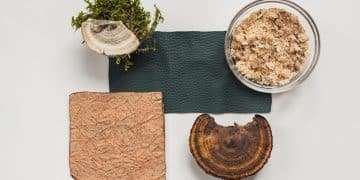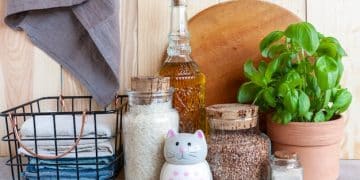Reduce Plastic Waste: 10 Simple Swaps for a Plastic-Free Life

Reducing plastic waste can be achieved through simple lifestyle changes, such as using reusable shopping bags, water bottles, and coffee cups, and opting for products with minimal or biodegradable packaging, contributing to a more sustainable environment.
Ready to ditch plastic and embrace a greener lifestyle? This guide unveils reduce plastic waste: 10 simple swaps for a plastic-free life, offering practical tips for US readers to minimize their environmental footprint.
Embrace the Plastic-Free Movement
Plastic waste is a pressing environmental issue, impacting ecosystems and human health. Switching to a plastic-free lifestyle can feel overwhelming, but small, consistent changes make a big difference. It’s about making conscious choices every day.
Why Reduce Plastic Waste?
Plastic pollution harms wildlife, contaminates water sources, and contributes to climate change. Microplastics found in the ocean end up in the food chain, affecting marine life and potentially human health. Reducing our reliance on plastic is crucial for preserving our planet.
Beyond environmental concerns, reducing plastic waste can also promote healthier living. Many plastic products contain harmful chemicals that can leach into food and beverages. By opting for reusable alternatives, you can minimize exposure to these toxins.
- Protecting Wildlife: Reducing plastic prevents entanglement and ingestion by animals.
- Conserving Resources: Manufacturing plastic requires fossil fuels and energy.
- Promoting Health: Avoiding plastic reduces exposure to harmful chemicals like BPA.
Making a commitment to reduce plastic waste is a step toward safeguarding our planet for future generations. It calls for a collective effort, and every small action counts.
Swap Single-Use Plastic Bags for Reusable Totes
Single-use plastic bags are a major source of pollution, often ending up in landfills or waterways. Switching to reusable totes is a simple yet effective way to reduce plastic waste. Keep them in your car or by the door so you don’t forget them!

Choose Durable and Eco-Friendly Materials
Opt for reusable totes made from durable materials like cotton, canvas, or recycled plastic. These bags can withstand heavy loads and last for years, replacing hundreds of single-use plastic bags. Consider investing in different sizes for various shopping trips.
Not all reusable bags are created equal. Look for options made from sustainable materials and ethical production practices. Avoid bags with excessive packaging or those that are not easily washable. A little research goes a long way in ensuring your reusable bags are truly eco-friendly.
- Cotton Canvas: Durable, washable, and biodegradable.
- Recycled Materials: Made from recycled plastic bottles or other waste materials.
- Hemp: A strong and sustainable natural fiber.
By making the switch to reusable totes, you are actively reducing plastic pollution and promoting a more sustainable shopping experience. Reduce plastic waste by planning and keeping your bags readily available for your next shopping trip.
Ditch Plastic Water Bottles with a Reusable Alternative
Plastic water bottles are a ubiquitous source of waste, with billions ending up in landfills each year. Investing in a reusable water bottle is a cost-effective and eco-friendly alternative. Hydrate sustainably!
Find the Perfect Reusable Water Bottle for Your Needs
Reusable water bottles come in various materials, including stainless steel, glass, and BPA-free plastic. Each has its own advantages and disadvantages. Consider your lifestyle and personal preferences when choosing a bottle that suits you best.

- Stainless Steel: Durable, non-toxic, and keeps water cold for hours.
- Glass: Free from chemicals, easy to clean, but more fragile.
- BPA-Free Plastic: Lightweight and shatter-resistant, but may not be as durable as other options.
Staying hydrated is essential for overall health, and using a reusable water bottle makes it easy to prioritize sustainability. Refill your bottle throughout the day and encourage others to do the same. Every sip helps reduce plastic waste and protect our planet.
Say No to Plastic Straws and Use Reusable Ones
Plastic straws may seem insignificant, but they contribute significantly to plastic pollution, especially in marine environments. Switching to reusable straws is an easy way to make a positive impact. Choose your preferred material and carry it with you!
Reusable straws come in various materials like stainless steel, bamboo, and silicone. Each has its own benefits. Stainless steel straws are durable and easy to clean, bamboo straws are biodegradable, and silicone straws are flexible and safe for children.
Many restaurants and cafes now offer reusable straws as an alternative to plastic ones. Don’t hesitate to request a reusable straw or simply decline a straw altogether. Your choices can influence businesses to adopt more sustainable practices.
Opt for Reusable Coffee Cups Instead of Disposable Ones
Disposable coffee cups are lined with plastic, making them difficult to recycle and contributing to landfill waste. Carrying a reusable coffee cup allows you to enjoy your favorite beverage without harming the environment. It’s a simple swap with a big impact.
Invest in a durable and insulated reusable coffee cup that fits your lifestyle. Many coffee shops offer discounts to customers who bring their own cups. This incentivizes sustainable behavior and helps you save money in the long run.
Make it a habit to keep your reusable coffee cup in your bag or car so it’s always accessible. This simple change can prevent dozens of disposable cups from ending up in the trash each year. Participating in reusable programs like this can effectively reduce plastic waste.
Choose Products with Minimal or Biodegradable Packaging
Excessive packaging is a common problem in the consumer goods industry. Opting for products with minimal or biodegradable packaging can significantly reduce waste. Look for items wrapped in paper, cardboard, or compostable materials.
Support businesses that prioritize sustainable packaging practices. Many companies are now offering eco-friendly alternatives to traditional plastic packaging. By choosing these products, you are sending a message that sustainability matters.
When possible, buy in bulk to reduce packaging waste. This is particularly helpful for items like grains, nuts, and spices. Bring your own reusable containers to further minimize your environmental footprint. Reduce plastic waste by making conscious choices in your purchases.
Buy in Bulk and Use Your Own Containers
Buying in bulk reduces the amount of packaging you bring home. By using your own reusable containers, you can eliminate plastic bags and containers altogether. Look for bulk sections at your local grocery store or co-op.
Bring a variety of reusable containers in different sizes to accommodate different items. Label your containers clearly to avoid confusion at the checkout. This simple practice can significantly reduce your plastic waste and save you money in the long run.
Consider joining a local co-op or buying club to access bulk items at wholesale prices. This is a great way to save money, support local businesses, and reduce your environmental impact.
Make Your Own Cleaning Products
Commercial cleaning products often come in plastic bottles and contain harsh chemicals. Making your own cleaning products is a cost-effective, eco-friendly, and healthier alternative. Use simple ingredients like vinegar, baking soda, and essential oils.
Find recipes online for homemade cleaning solutions that suit your needs. Store your homemade cleaners in reusable glass bottles or jars. This eliminates plastic waste and reduces your exposure to harmful chemicals.
Homemade cleaners are not only better for the environment but also for your health. Avoid harsh chemicals that can irritate your skin and respiratory system. Embrace natural cleaning solutions for a healthier home and a more sustainable lifestyle.
Choose Bar Soap Over Liquid Soap
Liquid soap often comes in plastic bottles, while bar soap typically comes in paper packaging. Switching to bar soap is a simple way to reduce plastic waste in your bathroom. Opt for natural and unscented options.
Look for bar soaps made from sustainable ingredients and packaged in biodegradable materials. Avoid soaps with excessive packaging or those that contain synthetic fragrances and dyes. Natural bar soaps are gentler on your skin and better for the environment.
Consider using shampoo and conditioner bars as well. These solid alternatives eliminate the need for plastic bottles altogether and are perfect for travel. Reduce plastic waste with these simple swaps.
Compost Food Waste Instead of Using Plastic Bags
Composting food waste is a great way to reduce your environmental impact and create nutrient-rich soil for your garden. Instead of using plastic bags to collect food scraps, use a compost bin lined with paper or compostable bags.
Start a compost bin in your backyard or join a local composting program. Composting reduces landfill waste and creates valuable resources for your garden. It’s a win-win for the environment and your plants.
Educate yourself on what types of food scraps can be composted. Avoid composting meat, dairy, and oily foods, as these can attract pests and create unpleasant odors. Embrace composting as a way to nourish your garden and reduce your plastic waste.
| Key Point | Brief Description |
|---|---|
| 🛍️ Reusable Bags | Replace single-use plastic bags with durable, eco-friendly totes. |
| 💧 Reusable Bottles | Ditch plastic water bottles for stainless steel, glass, or BPA-free alternatives. |
| 🧼 Bar Soap | Switch from liquid soap in plastic bottles to bar soap with paper packaging. |
| ☕ Reusable Coffee Cups | Use your own reusable mug instead of disposable coffee cups. |
FAQ
Reducing plastic is crucial to protect wildlife, conserve resources, and diminish exposure to harmful chemicals. Every small effort helps in the long run towards sustainability.
Start with simple swaps like using reusable bags and water bottles. Refuse plastic straws and opt for products with minimal or biodegradable packaging. These small changes add up.
Buy in bulk using your containers and make your own cleaning products. Composting food waste also helps reduce plastic bags used for garbage disposal, promoting zero waste habits.
Yes, if used consistently. Reusable products reduce the demand for short-lived plastics. Choose durable materials over disposable ones, ensuring sustainable long-term utility is prioritized.
Look for stores that offer bulk sections and sustainable products. Farmers’ markets often have vendors with produce free from plastic packaging. Researching local options supports eco-friendly businesses significantly.
Conclusion
Embracing a plastic-free lifestyle is a journey, not a destination. By implementing these simple swaps, you can significantly reduce plastic waste and contribute to a healthier planet. Remember, every small action counts, and together, we can make a big difference. Keep striving for sustainable practices day by day.





